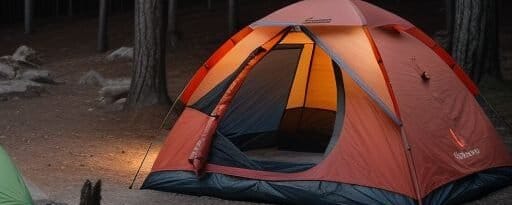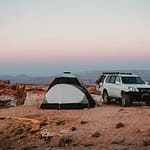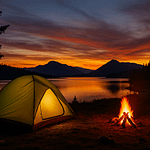How Much Does RV Camping Cost?
How Much Does RV Camping Cost? The Complete 2025 Budget Breakdown That Will Shock You
Discover the real costs behind RV camping adventures – from shocking budget secrets to luxury splurges
Picture this: You’re scrolling through Instagram, mesmerized by those stunning sunset photos from someone’s “budget-friendly” RV adventure, when suddenly you’re hit with sticker shock. That dreamy RV lifestyle everyone’s raving about? It might cost way more (or surprisingly less) than you think. Whether you’re planning your first weekend getaway or considering the full-time RV life, the truth about RV camping costs might completely change your travel plans.
The RV camping world has exploded in popularity, especially since 2020, but with that growth comes a wide spectrum of costs that can make or break your adventure budget. From free boondocking spots that cost absolutely nothing to luxury RV resorts charging $200+ per night, the range is mind-boggling. But here’s the real kicker – most people grossly underestimate the true cost of RV camping, missing hidden expenses that can double their expected budget.
The Real Cost Breakdown: What You’re Actually Paying For
When people ask “how much does RV camping cost,” they’re usually thinking about campground fees. But seasoned RVers know that’s just the tip of the iceberg. Let’s break down the real numbers you need to know.
Daily RV Park Costs: The Foundation of Your Budget
The most straightforward expense in RV camping is your nightly site fee. Budget-friendly campgrounds typically charge between $20-$40 per night, while mid-range options hover around $50-$80. But if you’re eyeing those Instagram-worthy luxury RV resorts with pools, spas, and concierge services, expect to shell out $100-$200+ per night.
“The biggest mistake I see new RVers make is budgeting only for the campground fee. In reality, that’s maybe 40% of your total camping costs. You need to factor in fuel, food, activities, and those unexpected maintenance issues that always seem to pop up on the road.”
— Sarah Mitchell, Full-time RVer and Travel Blogger
Here’s what affects your daily campground costs:
Location, Location, Location: A basic campground in rural Montana might charge $25/night, while the same amenities near Yellowstone could cost $75/night. Coastal locations and popular national park areas command premium prices, often doubling or tripling inland rates.
Seasonal Pricing: Peak season rates can increase by 50-100%. That $40/night campground in spring might become $80/night during summer months. Smart RVers plan their travels during shoulder seasons to maximize savings.
Amenities and Hookups: Basic sites with no hookups start around $15-25/night. Add electricity, and you’re looking at $25-35. Full hookups (electric, water, sewer) typically range from $35-60 for standard campgrounds. Luxury resorts with premium amenities can exceed $100/night easily.
Free and Low-Cost Camping Options: The Budget Traveler’s Dream
Here’s where RV camping gets exciting for budget-conscious adventurers. Free boondocking opportunities exist across America, from Bureau of Land Management (BLM) lands to National Forest Service campgrounds. These dispersed camping areas offer stunning natural settings without the price tag.
Boondocking and Dry Camping: Free camping is possible on millions of acres of public land. BLM areas typically allow 14-day stays at no cost, while some National Forest campgrounds charge just $5-15/night. The trade-off? No hookups, which means relying on your RV’s batteries, water tanks, and waste management systems.
“Boondocking taught us more about self-sufficiency than any camping guide ever could. We’ve stayed in incredible locations – from desert sunrises in Arizona to mountain vistas in Colorado – all for the cost of getting there. It’s not just about saving money; it’s about experiencing nature in its purest form.”
— Mike and Linda Thompson, Retired Full-timers
Membership Programs and Discount Clubs: Smart RVers leverage membership programs for significant savings. Passport America offers 50% discounts at participating campgrounds for $44/year. Good Sam Club provides 10% discounts plus other perks for $29/year. Thousand Trails and Escapees offer different membership models that can reduce costs dramatically for frequent campers.
State and County Parks: Often overlooked gems, state parks typically charge $15-35/night and offer excellent facilities. Many state park systems offer annual passes that pay for themselves after just a few visits.
Monthly and Extended Stay Costs: Long-term Budget Planning
For longer adventures or full-time RV living, monthly rates offer substantial savings. Monthly RV park costs range from $350-$500 at budget-friendly locations to $1,500+ at luxury resorts. The sweet spot for most RVers falls between $600-$900/month for decent facilities with full hookups.
Full-time RV Living Costs: The Complete Picture
Full-time RV living presents unique financial considerations. Recent surveys show monthly budgets ranging from $1,600 for minimal living to $5,000+ for luxury lifestyles. The median falls around $2,500-$3,000/month, including all living expenses.
Breaking Down Full-time Costs: Campground fees typically represent 30-50% of total monthly expenses. Add fuel costs ($300-600/month for frequent movers), food ($400-800/month), insurance ($200-400/month), maintenance ($200-500/month), and miscellaneous expenses, and you’ll understand why budgeting is crucial.
“The financial freedom of RV living isn’t automatic – it requires discipline and smart choices. We’ve seen couples live comfortably on $2,000/month by choosing longer stays, cooking at home, and prioritizing free activities. We’ve also seen people spend $6,000/month on resort living and dining out. The lifestyle adapts to your budget, not the other way around.”
— Jennifer Martinez, RV Financial Advisor
Hidden Costs That Catch RVers Off Guard
Experienced RVers will tell you the sticker price is never the whole story. Here are the sneaky expenses that can derail your budget if you’re not prepared.
Fuel and Transport
unexpected costs of rv camping
ation Costs
RV fuel consumption varies dramatically based on size, weight, and driving conditions. Class A motorhomes typically achieve 6-10 MPG, while truck-and-trailer combinations might get 8-12 MPG. With diesel prices fluctuating and distances adding up quickly, fuel can easily become your second-largest expense after campground fees.
Calculate fuel costs realistically: A 2,000-mile road trip in a Class A getting 8 MPG with diesel at $4.50/gallon costs $1,125 just in fuel. Add wear and tear, and transportation costs can exceed your campground budget.
Maintenance and Emergency Repairs
RVs are complex machines constantly exposed to road vibrations, weather extremes, and heavy use. Budget 10-15% of your RV’s value annually for maintenance and repairs. A $50,000 RV should have a $5,000-7,500 annual maintenance budget.
Common unexpected expenses include tire replacements ($200-400 each), appliance repairs ($300-1,500), and system maintenance (plumbing, electrical, HVAC). These costs don’t care about your vacation budget – they happen when they happen.
Food and Dining Costs
RV travel changes your dining patterns significantly. While you have a kitchen, you’ll likely eat out more than at home due to exploring new areas and convenience factors. Budget $50-100 per person per day for food, including groceries and occasional restaurant meals.
“Food costs on the road surprised us more than anything else. Between smaller RV refrigerators requiring frequent grocery runs, higher prices in tourist areas, and the temptation to try local restaurants, our food budget increased 40% from home. Planning meals and finding local grocery stores became essential skills.”
— David Chen, Weekend RV Enthusiast
Regional Cost Variations: Where Your Dollar Goes Furthest
Location dramatically impacts RV camping costs. Understanding regional pricing helps stretch your budget and plan more effectively.
High-Cost Regions
West Coast: California, Oregon, and Washington command premium camping prices. Expect $60-120/night for decent campgrounds, with luxury resorts reaching $200+/night. State parks offer better value at $35-55/night but require advance reservations.
National Park Areas: Campgrounds near Yellowstone, Grand Canyon, Yosemite, and other popular parks charge premium rates. Private campgrounds capitalize on proximity, often charging 2-3 times normal rates during peak seasons.
Popular Coastal Destinations: Florida Keys, Outer Banks, California coast, and Gulf Coast areas maintain high prices year-round, with seasonal peaks reaching astronomical levels.
Budget-Friendly Regions
Midwest and Plains States: Kansas, Nebraska, Iowa, and similar states offer excellent value. Quality campgrounds charge $25-45/night, and abundant state parks provide beautiful settings at reasonable prices.
Southeast (excluding coastal areas): Tennessee, Kentucky, Arkansas, and inland areas of other southeastern states offer great camping value with mild climates and scenic locations.
Southwest Desert Areas: Arizona, New Mexico, and parts of Texas offer excellent winter camping at reasonable prices, especially for boondocking enthusiasts.
Money-Saving Strategies That Actually Work
Smart RVers employ proven strategies to dramatically reduce camping costs without sacrificing enjoyment.
Timing and Flexibility
Travel During Off-Peak Seasons: Shoulder season travel can reduce costs by 30-50%. Late fall and early spring offer pleasant weather in many regions at significantly lower prices.
Extended Stays: Most campgrounds offer weekly and monthly discounts. A campground charging $50/night might offer weekly rates at $280 (equivalent to $40/night) and monthly rates at $900 (equivalent to $30/night).
Weekday Camping: Many campgrounds charge premium rates for weekends. Arriving Sunday and leaving Thursday can save 20-30% on total costs.
Membership and Discount Programs
Camping Clubs: Good Sam, KOA Value Kard, and similar programs offer consistent 10% discounts that add up quickly over multiple stays.
Military and Senior Discounts: Many private campgrounds offer military and senior discounts of 10-15%. Federal recreation passes provide access to National Park campgrounds at reduced rates.
Loyalty Programs: Major campground chains offer loyalty programs with free nights, upgrades, and exclusive member rates.
“Our camping costs dropped 60% once we started combining strategies. We use membership discounts, travel off-season, stay longer at each location, and mix paid campgrounds with free boondocking. The key is planning ahead and staying flexible with your itinerary.”
— Robert and Carol Anderson, Retired RV Nomads
Alternative Camping Options
Harvest Hosts: This unique program allows RV camping at farms, wineries, and breweries across America. For $99/year, members can stay one night for free at hundreds of locations, though purchases are encouraged to support hosts.
Boondockers Welcome: A community-based program connecting RVers with property owners offering free overnight parking. Membership costs vary, but stays are typically free.
Walmart and Truck Stop Camping: While not glamorous, many Walmart stores and truck stops allow overnight RV parking for free. Perfect for travel days when you need a safe place to rest without paying campground fees.
Budget Planning Tools and Real-World Examples
Successful RV adventures start with realistic budget planning. Here are proven approaches and real examples from experienced RVers.
Sample Budget Scenarios
Weekend Warriors (2-3 days):
Campground fees: $50/night × 2 nights = $100
Fuel (200 miles): $50
Food and dining: $150
Activities and attractions: $75
Total Weekend Cost: $375
Two-Week Vacation:
Campground fees: $60/night × 14 nights = $840
Fuel (1,500 miles): $400
Food and dining: $700
Activities and attractions: $300
Maintenance/emergency fund: $200
Total Two-Week Cost: $2,440
Monthly Full-time Living:
Campground fees: $700
Fuel: $400
Food: $600
Insurance: $300
Maintenance: $300
Communications/internet: $150
Personal expenses: $350
Total Monthly Cost: $2,800
Cost-Tracking Apps and Tools
Modern technology makes budget tracking easier than ever. Apps like RV Life Trip Wizard help plan routes and estimate costs. Campground booking apps often show price comparisons and reviews. Simple spreadsheet templates can track actual versus budgeted expenses across categories.
“Tracking expenses seemed tedious at first, but it revolutionized our RV adventures. We discovered we were spending 40% more on dining out than planned, but only 60% of our budgeted campground fees thanks to finding great deals. Now we allocate money more effectively and enjoy our trips without financial stress.”
— Amanda Rodriguez, RV Travel Planner
Making RV Camping Affordable for Every Budget
The beauty of RV camping lies in its adaptability to virtually any budget. Whether you’re pinching pennies or ready to splurge, there’s an RV camping experience that fits your financial situation.
Ultra-Budget Approach ($15-25/day)
Focus on free boondocking, National Forest campgrounds, and extended stays to reduce nightly costs. Cook all meals in your RV, limit fuel consumption with longer stays, and choose free entertainment like hiking and nature photography. This approach requires more planning and flexibility but opens incredible natural locations.
Moderate Budget Approach ($50-100/day)
Mix paid campgrounds with occasional free camping, eat out occasionally, and include some paid attractions and activities. This balanced approach provides comfort and convenience while maintaining reasonable costs.
Luxury Budget Approach ($150+/day)
Stay at resort-quality RV parks, dine at recommended restaurants, participate in guided tours and premium activities. This approach maximizes comfort and experiences without budget constraints.
Looking Forward: RV Camping Cost Trends
Understanding current trends helps plan future RV adventures and budget accordingly.
Rising Demand, Rising Prices: RV camping popularity continues growing, putting upward pressure on campground prices. Popular destinations see 5-10% annual increases, making early booking and alternative options more important.
Technology Integration: Dynamic pricing models, similar to hotels and airlines, are becoming common at larger RV resort chains. This creates both opportunities for deals and potential for higher peak pricing.
Infrastructure Investment: Many campgrounds are upgrading facilities, adding amenities, and improving wifi infrastructure. While this enhances the camping experience, it also contributes to higher prices.
“The RV industry is maturing rapidly. We’re seeing more professional management, better facilities, and higher service standards. Yes, this means higher prices, but also better value for money. The key is adapting your expectations and planning strategies to match these changes.”
— Thomas Wright, RV Industry Analyst
Your RV Camping Adventure Starts With Smart Planning
RV camping costs don’t have to be mysterious or budget-breaking. With proper planning, realistic expectations, and smart strategies, you can create amazing adventures that fit your financial situation. The key is understanding all cost components, not just the headline campground fees.
Start by determining your total budget, then work backward to allocate funds across categories: campgrounds (40-50%), fuel (20-25%), food (15-20%), activities (10-15%), and emergency fund (5-10%). This framework provides structure while maintaining flexibility for your preferred travel style.
Remember that RV camping is ultimately about experiences, not expenses. Whether you’re watching sunsets from a free boondocking spot or enjoying resort amenities at a luxury RV park, the memories matter more than the price tag. Smart budgeting simply ensures you can afford to make those memories repeatedly.
The RV lifestyle offers unparalleled flexibility in both experiences and costs. Start with your budget, choose your approach, and hit the road. Your perfect RV camping adventure – at the right price – is waiting for you to discover it.
Ready to start planning your RV adventure? Begin with a realistic budget, research your destination costs, and don’t forget to factor in those hidden expenses. Your wallet – and your future camping self – will thank you for the preparation.












